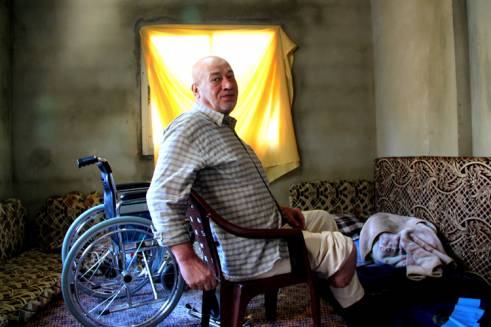PRESS RELEASE: Strictly embargoed until 00:01 March 14th 20014
On the third anniversary of the start of the Syrian conflict, HelpAge International is highlighting the plight of the civil war’s “silent casualties”: the invisible victims of the war who have succumbed both in Syria and also in host countries to what were previously manageable chronic illnesses.
Lack of physical and financial access to regular health care and medication has placed additional stress on people living with chronic disease in exile. This impact is accentuated by the fact that, before the conflict, people in Syria with non-communicable diseases were accustomed to regular treatment. This is in addition to the fact that many of those injured, disabled or traumatised by the fighting will require care and assistance for life.
A forthcoming survey, produced jointly with Handicap International, indicates that 54% of older Syrian refugees living in Jordan and Lebanon have a chronic disease – with war bringing a brutal and damaging interruption to their treatment. The physical, psychological and economic consequences of the conflict in Syria, and in neighbouring countries which have taken in Syrian refugees, are worsening by the day. The research highlights the fact that older refugees fleeing Syria are affected disproportionately by a variety of conditions, including impairment, and are facing additional difficulties to cope with their displacement.
Displacement has a severe negative impact in the daily life of older people. In the experience of HelpAge International and Handicap International, the presence of a supportive family, but more broadly the existence of an organized network support is an essential part in reducing vulnerability.
Toby Porter, CEO of HelpAge International, said:
“While the perspective for the future still remains unclear, on the third anniversary of the conflict we can see the current Syrian crisis is getting increasingly protracted and will bring additional challenges for both refugees and the host country.
“The loss of previously existing coping mechanisms and support networks also has a big impact on older people. When fleeing the fighting, older people often leave behind a supportive physical and social environment. Life in exile means they often no longer have accessible homes and workplaces, secured access to treatment or connection with family members and relatives.”
Case study: Suffering in exile

Ahmed Khair Birjawi (67) suffers from diabetes and cardiovascular disease. Complications of his diabetes led to the amputation of his lower right leg in 2006. Because of the fighting in his hometown, he and his family were forced to flee to Lebanon.
Ahmed and his family are originally from Qalamoun, in western Syria. They arrived in Tripoli in January of this year, and live on the second floor of an apartment building. Supported by his wife, Ilham, their son, Mustafa, and Mustafa’s wife and two daughters, the family tries to make the best of it, supporting Ahmed with his daily activities, including his exercises aimed at strengthening his upper right leg.
Suffering from chronic illnesses, Ahmed is concerned about obtaining his medicines:
“I need my medication. That is what is most important to me.”
Ahmed’s wife, Ilham, explains:
“We bought a stack of his medicines in Syria and brought them with us. Now his medicines are running out. In the next ten days he won’t have all the medication that he needs anymore. We are trying to get insulin, but it is difficult to find, and we didn’t manage until now. The doctor in the hospital wants to see Ahmed before prescribing anything, but it is impossible to get Ahmed to the hospital.”
-ENDS-
Notes to editors
1. Since 2012, Handicap International and HelpAge International have been key actors in supporting the most vulnerable persons among Syrian refugees, such as persons with disabilities and older persons. These vulnerable persons, sharing the same difficult living conditions than the general refugee communities are often relatively invisible to the eyes of the main response actors, and therefore de facto excluded from assistance; they are paying a double toll to the conflict. In addition, the lack of reliable and disaggregated data about prevalence and specific situations of this particularly vulnerable part of the population is often highlighted as a major challenge to more accurately respond to their need.
2. March is also the one year anniversary of the DEC’s Syria Crisis Appeal (March 21st) which brought together 14 leading UK aid charities together in times of crisis: ActionAid UK, Age International, British Red Cross, CAFOD, Care International, Christian Aid, Concern Worldwide, Islamic Relief, Merlin, Oxfam, Plan UK, Save the Children, Tearfund and World Vision; all collectively raising money to reach those in need quickly.
About HelpAge International
HelpAge International helps older people claim their rights, challenge discrimination and overcome poverty, so that they can lead dignified, secure, active and healthy lives. Our work is strengthened through our global network of like-minded organisations – the only one of its kind in the world.
Contact Attila Kulcsar at HelpAge International’s office in London on +44 (0) 20 7148 7623 (mobile: +44 (0) 7713 567624 or email akulcsar@helpage.org).
